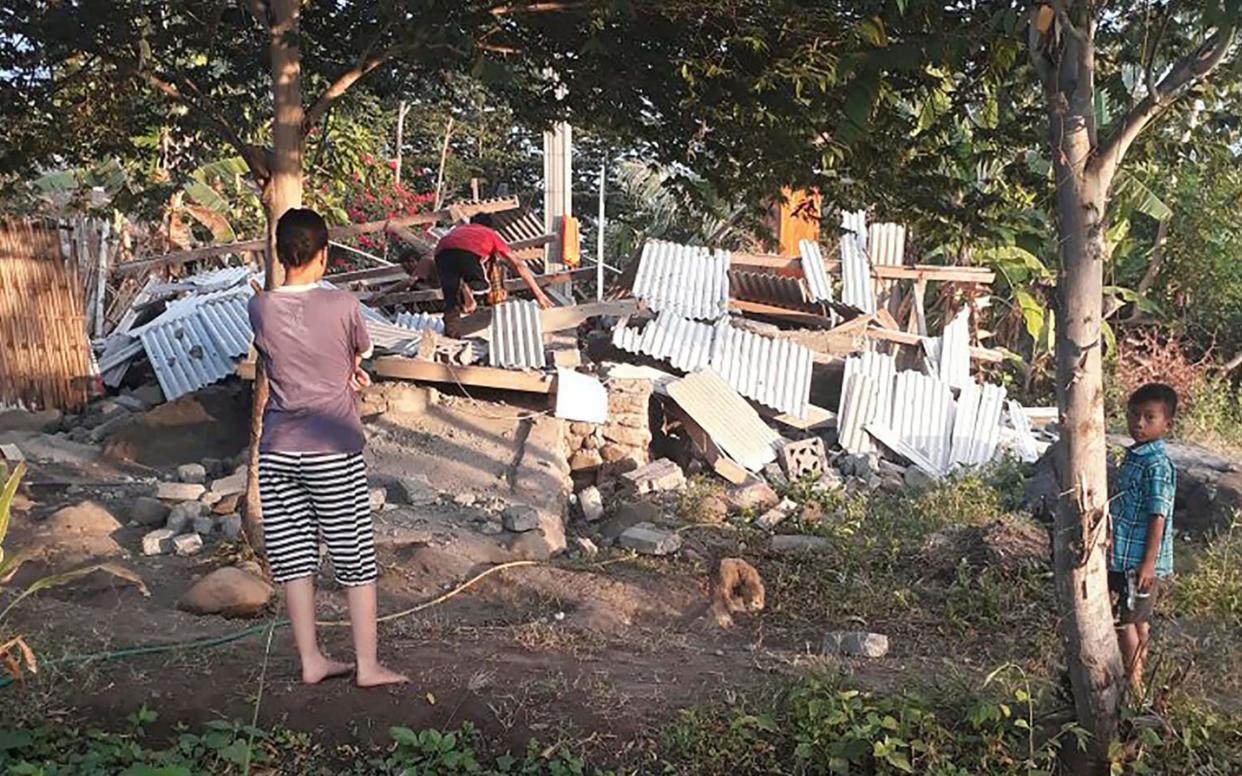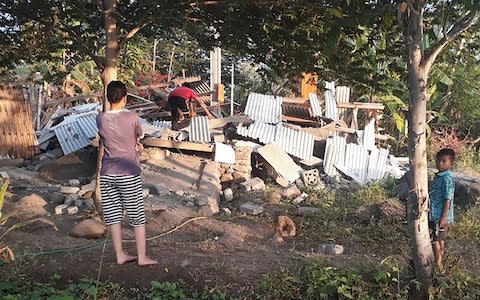Indonesia earthquake: At least 98 dead as tourist island of Lombok shaken by 6.4-magnitude tremor

British tourists have described their terrifying escape from a maqnitude 7 earthquake which struck the Indonesian holiday islands of Lombok and Bali on Sunday evening, killing at least 98 people.
Amid chaotic scenes, thousands, including many foreign tourists, were still waiting to be evacuated from the worst affected areas of Lombok on Monday night, as rescuers frantically rushed to save the injured and buried.
An estimated 20,000 are now homeless and more than 200 injured, with some being treated for gruesome crush injuries out in the open, next to damaged hospitals. Dozens are feared to still be trapped under a mosque in the village of Lading-Lading which collapsed during evening prayers.
Sutopo Purwo Nugroho, the national disaster agency spokesman, tweeted a horrifying video of the ruins, telling reporters that the number of victims across the earthquake zone was expected to rise.
Among the tourists who had a narrow escape was Hannah Small from Bournemouth, who described to the Telegraph how she had been in the bathroom in her hotel in Ubud, Bali, when the walls began to sway.
“I was in the bath and the whole room started shaking viciously. Parts of our ceiling were falling down and the walls were cracking,” she said.

“My partner grabbed me out of the bath with a towel and we ran down three flights of stairs to reach the ground floor for safety. The hotel staff were panicking, which made the guests even more worried,” Ms Small added.
“Once the quake was over everyone was scared to go back to their bedrooms and spent a few hours sat outside together. Through the night there were small aftershock rumbles which kept everyone up.”
Ms Small was able to leave on Monday for the safety of Singapore. Tourists and locals in Lombok, particularly in the less accessible tropical Gili islands, host to popular diving resorts off the northwest coast, faced a traumatic evacuation, however.
Mr Sutopo said that 2,700 tourists had been removed from the islands so far. But many remained trapped for a second night outside.
“We’re still trying to get back to Bali from Lombok. There’s a lot of scared and battered people around,” tourist Becky Morris tweeted on Monday night.
Throughout the day dramatic footage emerged of frightened crowds jostling on palm-fringed sandy beaches and pushing over each other to access a limited number of rescue boats.
Helen Milne from Oxfordshire told the BBC that her daughter, Laura, was trapped on the island of Gili Trawangan.
She said: "They are stuck on the island and are reporting rioting, fighting, and people can't get on boats. There's no water, no food, the shops have been ransacked. It's a rapidly deteriorating situation out there for them."
Mads and Tanni Jacobsen, from Denmark, told the Telegraph of scenes of panic as they tried to escape from Gili Air with their two children Alma, 3, and Signe, 11.
Wake up in the morning with the shaking bed !
Got called from farm and so many facility broke down..#agendafreetv#lombok#earthquakepic.twitter.com/GbANUMLpxW— Reyn (@suharja_reynard) July 28, 2018
The family had spent Sunday night sheltering with locals in a nearby school, petrified by conflicting reports of an approaching tsunami.
Ms Jacobsen, a nurse, had helped to treat badly injured victims with a First Aid kit before the family joined the throngs waiting to be rescued from the beach.
“We stood in line and waited for two hours. It was difficult with the kids as people didn’t have good behaviour at that moment. Everyone was shoving, swimming with life jackets to catch the boat,” said Mr Jacobsen. The family were then charged $100 for one seat on a rescue vessel.
The Jacobsens are now in the relative safety of Lombok’s main airport in the town of Mataram, sleeping on floors with hundreds of other tourists waiting to fly out.
Fears are rising, however, for residents of the north of the island, a more residential and less developed area close to the earthquake’s epicentre, which is difficult for rescue teams to reach due to damaged roads.
Endri Susanto, who runs an organisation helping the relief efforts, told CNN that he had found a “totally broken” hospital in the north.
“I saw about 80 per cent of the houses, 80 per cent of the buildings had fallen down or collapsed because of the earthquake,” he said of the surrounding area.

